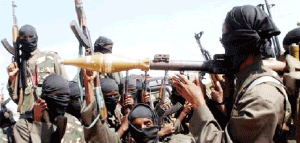Assistant Politics Editor, DANIEL KANU examines Boko Haram’s renewed offensive and President Muhammadu Buhari’s tall order to contain the menace.
Before the inauguration of the President Muhammadu Buhari administration on May 29, the impression had been created that almost all the territories held by Boko Haram extremists had been recaptured by the Nigerian Army, with the assistance of neighbouring Niger, Chad and Cameroon. Nigerians had then hoped that the war against insurgency would soon be over and peace restored to the troubled parts of the country in a matter of weeks.
 What gave room to the euphoria was that during the six-week postponement of the general elections from the original February to March/April dates, military bombardment in the North East had recorded huge successes.
What gave room to the euphoria was that during the six-week postponement of the general elections from the original February to March/April dates, military bombardment in the North East had recorded huge successes.
In what appeared a moral fibre to the military operations, Buhari had during his campaigns pledged that he would nail the final coffin of the insurgency in the land, if elected.
Against the backdrop of his military background and his integrity profile, Nigerians cheered and believed him.
In what seemed a follow-up, the President, on inauguration, put up commendable efforts that resulted in military co-operation involving Nigeria and her neighbours with visits to Chad, Niger and Cameroun, as well as approval of the budget for the Joint Multi-national Task Force to be based in Ndjamena, Chad.
He also seized the opportunity of the June G-7 Summit in Germany to convince leading Western nations to make commitments to assist Nigeria rebuild the North East region and help in the mission to get rid of Boko Haram.
Spanner in the works
Sadly enough, these efforts have not dissuaded the terrorists from their violent campaigns of spilling innocent blood.
If anything, taming the sect appears to have remained a tall order, especially as its operatives continue their attack with vicious audacity and changing tactics to hit soft targets. Having been deprived of the territories they had earlier annexed, the insurgents have resorted to suicide bombings.
Consequently, since Buhari’s inauguration on May 29, no fewer than 1000 Nigerians have been killed, hundreds injured and property worth millions of naira destroyed by the sect.
On account of the terrorists’ growing antics, many had expressed concern that the nation’s security agencies seem to have become complacent after earlier victories.
Enter the United Nations
Somehow, the United Nations (UN), seemed to have had a premonition of the danger ahead, when, shortly after the election, it charged Buhari to sustain the gains recorded by immediate past President Goodluck Jonathan’s administration in the fight against the terrorists.
Muhammad Ibn Chambas who was a Special Representative of the United Nations Secretary General, Ban Ki-Moon, met behind closed doors with the President in Kaduna on the issue of insecurity.
Speaking to journalists shortly after their meeting, Chambas said “sustaining the victory achieved by the military over the insurgents will give room for the rehabilitation and reconstruction of persons and communities affected by the attacks”.
He also reaffirmed UN’s readiness to support Nigeria and other countries in West and Central Africa to end Boko Haram terrorist attacks against their citizens.
But even with pledges from countries and multi-national bodies to assist in containing the terror war, it was apparent that more needed to be done in real terms to confront the menace.
Back to the trenches
But the military is not relenting. In fact, its men seem equal to the task. Last week for instance, the Army announced that its counter insurgency troops recorded decisive victory against Boko Haram fighters in fierce battle in Borno.
Army spokesman, Colonel Sani Kukasheka Usman, specifically disclosed that the troops from the Army Task Force Brigade engaged insurgents fleeing Sambisa, their main hideout, following massive air bombardment.
Part of the statement read, “Troops of 26 Task Force Brigade in Gwoza, Borno State, Wednesday, evening engaged Boko Haram terrorists fleeing Sambisa forest following continued aerial bombardment by the Nigerian Air Force,”
The statement noted further that the fleeing insurgents were seen in “seven Pick-Up Vans and some motorcycles mounted with assorted weapons such as Rocket Propelled Grenades and Anti-Aircraft Guns” adding that the troops killed quite a number of the insurgents.
“The troops also destroyed their vehicles, weapons and motorcycles. They also recovered one vehicle, one motorcycle and two AK47 riffles and large quantities of 7.62mm NATO and 12.7mm ammunitions”, he enthused.
Buhari’s marching order
The relative success by the Army did not come to many as a surprise. It was rather seen as falling in line with renewed vigour that flowed from appointment of new Service Chiefs for the various wings of the Armed Forces. The President, had, at the swearing-in of the new Service Chiefs charged them to synergise with other security apparatus in the nation and hunt down Boko Haram insurgents within the next three months. He added that his administration would do all it can to support the security agencies in not only halting the Boko Haram menace but uprooting all incidences of crime in the country.
Buhari reiterated his commitment in this respect, when last Monday, he remarked that his government would be recruiting additional 10,000 police officers to fortify the existing personnel in the Force.
Time-up on criminality
The President who spoke at the “National Security Summit on Community Partnership Approach to Internal Security and Crime Management”, organised by the Police in Abuja, said the government would also establish a well-trained and equipped anti-terrorism and multi-agency based task force to address the challenge of insurgency in a sustainable manner.
He added that he would stop at nothing to ensure that his administration contained Boko Haram madness.
The President noted that the need for community input to policing and crime management in the country has become more imperative considering the current national security challenges not only in the area of terrorism but in kidnapping, armed robbery, murder, transnational crimes, and other organised crimes.
He said in the meantime, efforts are being made to enhance the operational capacity of not only the Army but officers of the police force through training programmes that will give them the right civil orientation in their role as guardians of the constitution.
To improve public security, Buhari said consideration is also being given to the expansion of the Close Circuit Television (CCTV) Monitoring System across major cities and towns in the country.
“It is my high expectation that this National Security Summit will develop pathways for the attainment of this policy focus of the new administration”, the President said at the occasion.
Tunde Oseni, Political Science and International Relations Lecturer at Lead City University, Ibadan, said the three-month period given the security chiefs to crush Boko Haram is good for confidence, not for performance.
The order, he said, seems tall and very complex.
According to him, “from the security and intelligence performance, it is misplaced. These are guys you don’t know their numbers; you don’t know their location (aside Sambisa Forest); you don’t know their network.
“But I think what Buhari has done is to say, ‘with what I have done, going to Niger, Chad, Cameroun and the support of the U.S., we will defeat them in three months, I think it is good for confidence, but it is not good for performance.’’
Managing intelligence deficit
Despite what is agreed as the government’s best intentions at tackling the security menace, analysts argue that the biggest drawback in the fight against Boko Haram remains the relative low level performance of Nigerian forces in intelligence gathering.
They note with pains that after seven years of a terrorist onslaught that has killed nearly 15,000 Nigerians, the nation’s intelligence agencies – the Department of State Service (DSS) and the Directorate of Military Intelligence (DMI) – in addition to the conventional security outfits, appear incapable of preempting and forestalling the bloody attacks.
Critics even insinuate that there are no strong indications that the security agencies know the inner workings of the terrorists. This seeming intelligence failure, it is argued, accounts for much of the death and destruction, which trail successive terror attacks.
Judgement abroad
It was apparently against this backdrop that America-based Time Magazine, had in its February 10, 2015 edition, claimed; “Nigeria’s military has so far proved incapable of containing Boko Haram, and there is little to indicate that anything has changed… That Nigeria’s army needs help dealing with what even its own leader’s call a rag-tag militia, seems to be a sobering indictment of an institution that was once considered the powerhouse of African peacekeeping”. Experts in foreign relations were hardly amused at this verdict which they described as unflattering and damning on a nation that aspires for a Permanent Seat in UN Security Council.
Negotiating with Boko Haram
There is the suspicion that it is the resurgence of Boko Haram atrocities especially in its varying strategies of attacks that is prompting the suggestion of negotiation with the terrorists, in some quarters. Government, incidentally, does not appear to be averse to this option. Buhari’s spokesman, Femi Adesina, on occasions, had admitted the readiness of the government to dialogue with leaders of the sect, if they are found to be real and make reasonable demands. The Senator representing Kaduna Central, Shehu Sani, who has volunteered to mediate in the talks, spoke in the same vein with Adesina. The insurgents were yet to come clean on their demands by the close of work, last week, thus, raising further questions on their actual agenda.
Notwithstanding government’s olive branch, specialists in terrorism warn on the dangers of negotiating with terrorists, adding however that if the option becomes imperative, it has to be undertaken with great deal of caution.
While they advise that government could engage the authentic leaders of the sect if the situation presents itself, they warn against negotiating with them on their terms.
They add that what the war against insurgency currently requires are concerted efforts by relevant authorities. By this they stress that among other strategies, the military must avoid complacency, make the best use of intelligence and launch a decisive offensive that can end menace, once and for all.
They insist that this is the time for all Nigerians to be extra vigilant and proactive in their efforts to protect themselves against terrorists.
Commentators are also agreed that this is the time to ensure that the military is properly equipped and motivated to put its very best into the efforts to win the war. The Joint Task Force, they stress, deserves all the support and encouragement it can get to tackle the crisis at hand.












